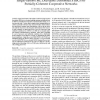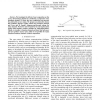152 search results - page 20 / 31 » To Code or Not To Code in Multi-Hop Relay Channels |
131
click to vote
TWC
2010
14 years 9 months ago
2010
This work evaluates opportunistic relaying in the presence of thermal noise as well as interference, when channel sensing is conducted reactively, in slow fading environments. The ...
128
click to vote
INFOCOM
2002
IEEE
15 years 7 months ago
2002
IEEE
Abstract— In [1], Gupta and Kumar determined the capacity of wireless networks under certain assumptions, among them point-to-point coding, which excludes for example multi-acces...
128
click to vote
ICC
2008
IEEE
15 years 9 months ago
2008
IEEE
—Space-time block codes (STBCs) that are single-symbol decodable (SSD) in a co-located multiple antenna setting need not be SSD in a distributed cooperative communication setting...
48
Voted
CORR
2006
Springer
15 years 2 months ago
2006
Springer
We propose novel lattice coding/decoding schemes for half-duplex outage-limited cooperative channels. These schemes are inspired by the cooperation protocols of Azarian et al. and ...
142
click to vote
CORR
2008
Springer
15 years 2 months ago
2008
Springer
We investigate the effects of user cooperation on the secrecy of broadcast channels by considering a cooperative relay broadcast channel. We show that user cooperation can increase...


